Related Research Articles
The Plame affair erupted in July 2003, when journalist Robert Novak revealed that Valerie Plame worked as covert employee of the Central Intelligence Agency, although the seeds of the scandal had been laid during 2001 and 2002 as the Bush administration investigated allegations that Iraq had purchased Nigerien uranium.
The Plame affair was a political scandal that revolved around journalist Robert Novak's public identification of Valerie Plame as a covert Central Intelligence Agency officer in 2003.
The CIA leak grand jury investigation was a federal inquiry "into the alleged unauthorized disclosure of a Central Intelligence Agency (CIA) employee's identity", a possible violation of criminal statutes, including the Intelligence Identities Protection Act of 1982, and Title 18, United States Code, Section 793.
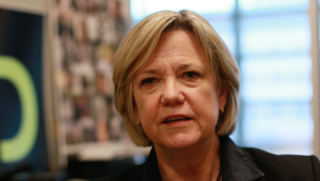
Dana Louise Priest is an American journalist, writer and teacher. She has worked for nearly 30 years for the Washington Post and became the third John S. and James L. Knight Chair in Public Affairs Journalism at the University of Maryland's Philip Merrill College of Journalism in 2014. Before becoming a full-time investigative reporter at the Post, Priest specialized in intelligence reporting and wrote many articles on the U.S. "War on terror" and was the newspaper's Pentagon correspondent. In 2006 she won the Pulitzer Prize for Beat Reporting citing "her persistent, painstaking reports on secret "black site" prisons and other controversial features of the government's counter-terrorism campaign." The Washington Post won the 2008 Pulitzer Prize for Public Service, citing the work of reporters Priest and Anne Hull and photographer Michel du Cille "exposing mistreatment of wounded veterans at Walter Reed Hospital, evoking a national outcry and producing reforms by federal officials."
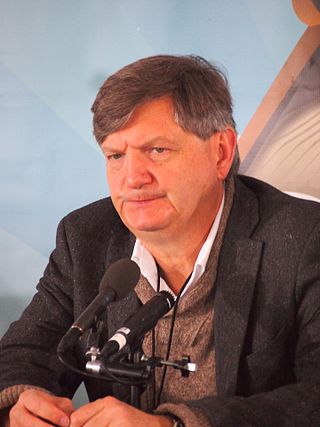
James Risen is an American journalist for The Intercept. He previously worked for The New York Times and before that for Los Angeles Times. He has written or co-written many articles concerning U.S. government activities and is the author or co-author of two books about the Central Intelligence Agency (CIA) and a book about the American public debate about abortion. Risen is a Pulitzer Prize winner.
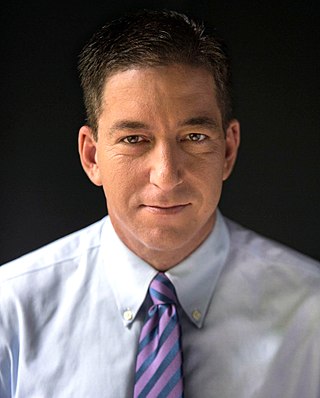
Glenn Edward Greenwald is an American journalist, author, and former lawyer.
R. Jeffrey Smith is a managing director of RosettiStarr LLC, a corporate security and intelligence firm, where he leads investigative work and conducts corporate risk analysis for attorneys, management teams, and investors worldwide. Its clients include corporate enterprises with global operations major private equity firms and hedge funds with a combined $650 billion in assets under management. He joined Rosetti Starr in November 2021.
The Plame affair was a dispute stemming from allegations that one or more White House officials revealed Central Intelligence Agency (CIA) agent Valerie Plame Wilson's undercover status. An investigation, led by special counsel Patrick Fitzgerald, was started, concerning the possibility that one or more crimes may have been committed. The initial focus was on Scooter Libby; however, he was not the primary source of the leak.
Anne Elise Kornblut is a Pulitzer Prize–winning American journalist who is currently serving as Vice President of Global Curation at Facebook. Kornblut has previously served as the deputy national editor of The Washington Post, overseeing national politics, national security and health/science/environmental coverage.
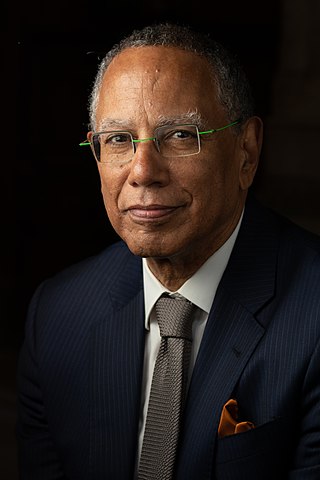
Dean P. Baquet is an American journalist. He served as the editor-in-chief of The New York Times from May 2014 to June 2022. Between 2011 and 2014 Baquet was managing editor under the previous executive editor Jill Abramson. He is the first Black person to have been executive editor.

Barton David Gellman is an American author and journalist known for his reports on the September 11 attacks, on Dick Cheney's vice presidency, and on the global surveillance disclosure. Beginning in June 2013, he authored The Washington Post's coverage of the U.S. National Security Agency, based on top secret documents provided to him by ex-NSA contractor Edward Snowden. He published a book for Penguin Press on the rise of the surveillance-industrial state in May 2020, and joined the staff of The Atlantic.

Carol Duhurst Leonnig is an American investigative journalist. She has been a staff writer at The Washington Post since 2000, and was part of a team of national security reporters that won the 2014 Pulitzer Prize for Public Service for reporting, which revealed the NSA's expanded spying on Americans. Leonnig also received Pulitzer Prizes for National Reporting in 2015 and 2018.

Laura Poitras is an American director and producer of documentary films.

Shane Harris is an American journalist and author. He is a senior national security writer at the Washington Post. He specializes in coverage of America's intelligence agencies. He is author of the books The Watchers: The Rise of America's Surveillance State and @War: The Rise of the Military-Internet Complex, about the impact of cyberspace as the American military's "fifth-domain" of war.

Global surveillance and journalism is a subject covering journalism or reporting of governmental espionage, which gained worldwide attention after the Global surveillance disclosures of 2013 that resulted from Edward Snowden's leaks. Since 2013, many leaks have emerged from different government departments in the US, which confirm that the National Security Agency (NSA) spied on US citizens and foreign enemies alike. Journalists were attacked for publishing the leaks and were regarded in the same light as the whistleblowers who gave them the information. Subsequently, the US government made arrests, raising concerns about the freedom of the press.
The Intercept is an online American nonprofit news organization that publishes articles and podcasts.

Ewen MacAskill is a Scottish journalist. He worked for 22 years on The Guardian, ending his career in September 2018 as the newspaper's defence and intelligence correspondent. MacAskill was involved in preparing the publication disclosures from Edward Snowden of the activities of the American National Security Agency (NSA).
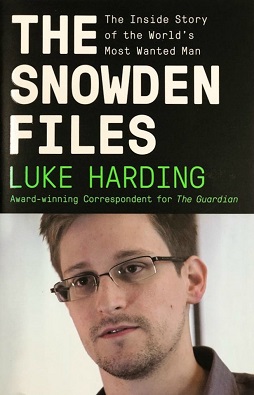
The Snowden Files: The Inside Story of the World's Most Wanted Man is a 2014 book by Luke Harding, published by Vintage Books.

Citizenfour is a 2014 documentary film directed by Laura Poitras, concerning Edward Snowden and the NSA spying scandal. The film had its US premiere on October 10, 2014, at the New York Film Festival and its UK premiere on October 17, 2014, at the BFI London Film Festival. The film features Snowden and Glenn Greenwald, and was co-produced by Poitras, Mathilde Bonnefoy, and Dirk Wilutzky, with Steven Soderbergh and others serving as executive producers. Citizenfour received critical acclaim upon release, and was the recipient of numerous accolades, including Best Documentary Feature at the 87th Academy Awards. This film is the third part to a 9/11 trilogy following My Country, My Country (2006) and The Oath (2010).

James Ball is a British journalist and author. He has worked for The Grocer, The Guardian, WikiLeaks, BuzzFeed, The New European and The Washington Post and is the author of several books. He is the recipient of several awards for journalism and was a member of The Guardian team that won the Pulitzer Prize for investigative journalism.
References
- ↑ Pincus, Walter (29 December 2015). "A farewell to The Washington Post". The Washington Post. Retrieved 30 December 2015.
- ↑ "Walter Pincus". American Academy in Berlin.
- 1 2 3 4 "Walter Pincus". Nieman Watchdog. Retrieved October 27, 2011.
- ↑ Seibel, Andrea (March 7, 2009). "Der Online-Journalismus wird überschätzt". Die Welt (in German). Retrieved October 27, 2011.
- ↑ Sherrill, Robert (March–April 1976). "The new regime at The New Republic". Columbia Journalism Review. Vol. 14, no. 6. p. 23. Archived from the original on 2012-04-06.
- 1 2 "Interview Walter Pincus". Frontline. July 14, 2006. Retrieved October 27, 2011.
- ↑ "Walter Pincus". The Washington Post. September 14, 2012.
- ↑ "Georgetown Law Establishes Degree Program for Journalists". Georgetown University. Retrieved October 27, 2011.
- ↑ "Profile: Walter Pincus". History Commons. Retrieved October 27, 2011.
- ↑ Sniffen, Michael J. (February 12, 2007). "Journalists Name Additional Leak Sources". Associated Press.
- ↑ Pincus, Walter (July 8, 2013). "Questions for Snowdown". The Washington Post. Washington Post.
- ↑ Greenwald, Glenn (July 10, 2013). "The journalistic practices of the Washington Post and Walter Pincus". London. The Guardian.
- ↑ Wemple, Erik (July 10, 2013). "Pincus responds to Greenwald blast". The Washington Post. Washington Post.
- ↑ "The Protest that knows no name". College Park, MD. American Journalism Review.
- ↑ "The 2002 Pulitzer Prize Winners: National Reporting (Citation)". The Pulitzer Prizes. Retrieved 2008-09-10.
- ↑ "Arthur Ross Award for Distinguished Reporting & Analysis on Foreign Affairs". The American Academy of Diplomacy. Retrieved October 27, 2011.